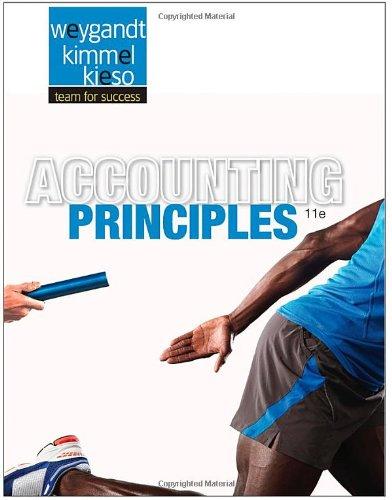Hassellhouf Companys trial balance at December 31, 2014, is presented below. All 2014 transactions have been recorded
Question:
Hassellhouf Company’s trial balance at December 31, 2014, is presented below. All 2014 transactions have been recorded except for the items described shown below.
.png)
Unrecorded transactions:
1. On May 1, 2014, Hassellhouf purchased equipment for $21,200 plus sales taxes of $1,600 (all paid in cash).
2. On July 1, 2014, Hassellhouf sold for $3,500 equipment which originally cost $5,000. Accumulated depreciation on this equipment at January 1, 2014, was $1,800; 2014 depreciation prior to the sale of the equipment was $450.
3. On December 31, 2014, Hassellhouf sold for $9,000 on account inventory that cost $6,300.
4. Hassellhouf estimates that uncollectible accounts receivable at year-end is $4,000.
5. The note receivable is a one-year, 8% note dated April 1, 2014. No interest has been recorded.
6. The balance in prepaid insurance represents payment of a $3,600 6-month premium on September 1, 2014.
7. The building is being depreciated using the straight-line method over 30 years. The salvage value is $30,000.
8. The equipment owned prior to this year is being depreciated using the straight-line method over 5 years. The salvage value is 10% of cost.
9. The equipment purchased on May 1, 2014, is being depreciated using the straight-line method over 5 years, with a salvage value of $1,800.
10. The patent was acquired on January 1, 2014, and has a useful life of 10 years from that date.
11. Unpaid salaries and wages at December 31, 2014, total $5,200.
12. The unearned rent revenue of $6,000 was received on December 1, 2014, for 3 months rent.
13. Both the short-term and long-term notes payable are dated January 1, 2014, and carry a 9% interest rate. All interest is payable in the next 12 months.
Instructions
(a) Prepare journal entries for the transactions listed above.
(b) Prepare an updated December 31, 2014, trial balance.
(c) Prepare a 2014 income statement and an owner’s equity statement.
(d) Prepare a December 31, 2014, classified balancesheet.
Salvage value is the estimated book value of an asset after depreciation is complete, based on what a company expects to receive in exchange for the asset at the end of its useful life. As such, an asset’s estimated salvage value is an important...
Step by Step Answer:

Accounting Principles
ISBN: 9781118566671
11th Edition
Authors: Jerry Weygandt, Paul Kimmel, Donald Kieso





